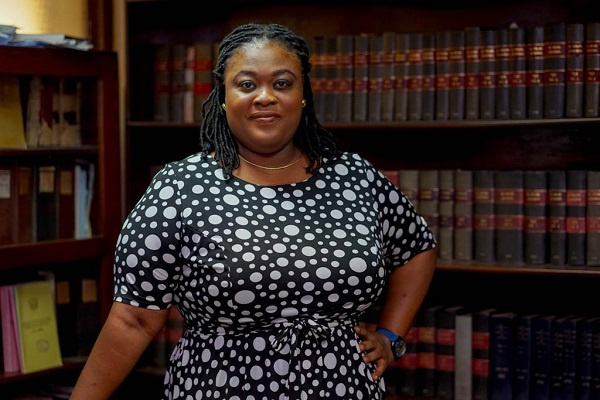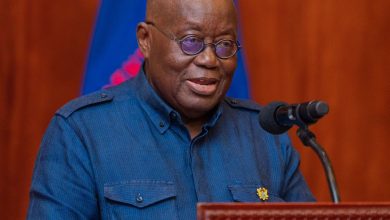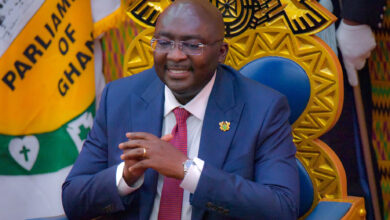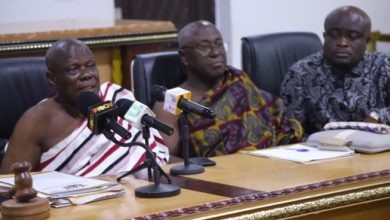Promote democratic ideals to stop coups – Diana Asonaba Dapaah urges ECOWAS leaders

The Deputy Attorney-General (AG) and Minister for Justice, Diana Asonaba Dapaah, has called on leaders and decision makers within the Economic Community of West African States (ECOWAS) to as a matter of priority, seek to consciously promote democratic ideals in their countries because it is the only sure way to stop coup d’états in the region.
She made the call in an interview with the Voice of Nigeria (VON) on the sidelines of the ECOWAS Community Court’s 2023 International Conference on Zero Tolerance for Unconstitutional Change of Government (UCG), in West Africa, held in Banjul, the capital city of The Gambia from Monday 22 to Saturday 27 MAY 2023.
“Coup or unconstitutional change of government unequivocally must be condemned. We need to interrogate and explore what have been the possible causes of the unconstitutional changes.
“Clearly, as it has been indicated, the whole idea of democracy cannot be self-sustaining unless we move from rhetoric to practice. What we mean by that, is that there must be political will and not just engaging in fanciful philosophies and ideas,” Diana Asonaba Dapaah said.
“What is the reflection of democracy, good governance, and rule of law, in the lives of the ordinary person on the street? That for me is the question that as leaders we must face and interrogate impartially and practically” the deputy AG added.
Unconstitutional practices
Stressing on her point, Madam Asonaba Dapaah, indicated that “it is not enough for a state to say that it has in place the policies, and the legislation that reflects the constitutional convergence principles,”.
She noted that unconstitutional change of government is not just about those who pick arms to overthrow an elected government but it includes those who use their constitutional power to change or amend their countries constitutions to extend their stay in office.
To this end, the deputy AG pointed out that the justification of some heads of state who have prolonged their stay in office has been the fact that the people or their citizens called for it.
This justification she noted, comes largely from the part of the population who are uneducated about political issues and the implications of the decisions their leaders take to extend their stay in office beyond what is constitutionally stipulated.
“Education will do so many things; education for instance, will disabuse the mind of the incumbent from thinking that he is the only wise person within the state and it is the same education that will inform the citizenry to balance the scale of the impact of going through constitutional change and making an informed decision,” Diana Asonaba Dapaah remarked.

Conference communique
Attendees of the he four-day conference according to a communique issued by the Authority, called for the strengthening of “the apolitical nature of the Armed Forces to guard against UCG,” and to utilize “early warning tools and existing Protocols to recalibrate the regional peace and security architecture.”
Participants, mostly jurists, lawyers and academics, called for definition of the term “unconstitutional change” in the ECOWAS instruments and what constitutes a violation of convergence principles clearly spelt out, said the Conference Communique. It also called on “Member States to stem tenure elongation, eliminate all pseudo-democratic laws, and criminalise UCG at the national level with national courts having jurisdiction.”
It recommended effective sanctions against perpetrators of UCG, including coup plotters and their supporters, with the amendment of the ECOWAS Supplementary Protocol on Democracy and Governance to “ensure that sanctions do not affect the fundamental human rights of ordinary citizens.”
The Communique urged a “review of the efficiency of sanctions” and creation of an implementation guideline, while calling for respect of term limits and an end to constitutional manipulations by incumbents to extend their mandates.
It further called for a stop to tenure extension by political leaders, while the Protocol of the Community Court of Justice should be modified to allow for judicial intervention in election matters.
It also recommended the strengthening of the means of settling electoral disputes at the national level through the enactment of laws and setting up of mechanisms for independent adjudication of electoral disputes.
The Conference called for an increase in the number of judges of the ECOWAS Court of Justice in line with International best practices and the amendment of the “Protocols on the Court to enable access to individual citizens in respect of violations of community laws/obligations including activating sanctions proceedings against member States.”
ECOWAS should “muster the political will to hold member States accountable to their treaty obligations,” the Communique said.
It further called for the guarantee of the independence of the judiciary and the strengthening of the capacity of courts to render justice and also recommended that the root causes of political conflicts should be addressed to ensure political stability, peace, and progress, as well as cultivation and strengthening of a democratic culture for economic growth.

ECOWAS should “combat corruption in public life as it undermines public confidence in state institutions and creates conditions for instability,” noted the Communique. It also called for measures against misinformation and disinformation, particularly the negative impact of social media and the involvement of the youth.
ECOWAS should ensure strict adherence by member States to the provisions of the African Charter on Human and Peoples’ Rights, and “effective implementation of regional Treaty and Protocols to make compliance thereof a condition for retaining the membership of the sub-regional bloc,” the Communique urged.
Furthermore, ECOWAS should strengthen the competences and enforcement capacities of the ECOWAS Court of Justice as well as focus on the fight against poverty and the promotion of social dialogue.
It urged that National Electoral Institutions should be supported with structured training of stakeholders such as political parties, Civil Society, academia, and the media, on community principles and values.
According to the Communique, ECOWAS should “utilise proactive preventive diplomacy, mediation and results oriented conflict management strategies driven by consistency, neutrality and inclusivity to deal with management and resolution of conflict.”
It called for the creation of a functional mediation, conciliation, and arbitration committee for settling disputes in ECOWAS countries, and with a standard Community legal framework for member States to fulfil their treaty obligations.
ECOWAS member States should ensure strict adherence to the provisions of the African Charter on Human and Peoples’ Rights, the Communique recommended, and called “a deliberate effort to discourage the teeming youths from being dangerously radicalised by Terrorists, Separatist Militias, Bandits, Kidnappers, and Ethno-religious fundamentalists within the West African sub-region.





